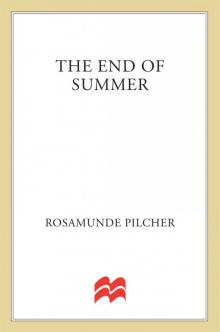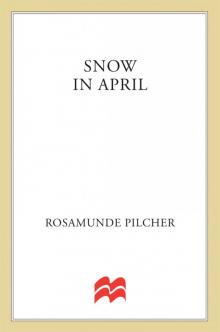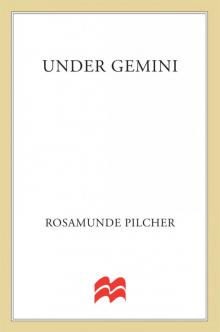- Home
- Rosamunde Pilcher
The Shell Seekers Page 2
The Shell Seekers Read online
Page 2
“Well … if you’re really all right, I might put it off for a bit. I’m actually frightfully busy this weekend. Mumma, have you spoken to Nancy yet?”
“No. I did think about it, and then I chickened out. You know how she fusses. I’ll call tomorrow morning, when Mrs. Plackett’s here, and I’m safely dug in and can’t possibly be budged.”
“How are you feeling? Truthfully, now.”
“Perfectly all right. Except, as I told you, a bit short of sleep.”
“You won’t do too much, will you? I mean, you won’t plunge out into the garden and start digging trenches or moving trees?”
“No, I won’t. I promise. Anyway, everything’s hard as iron. You couldn’t get a spade into the earth.”
“Well, thank God for small mercies. Mumma, I must go, I’ve got a colleague here in the office with me…”
“I know. Your secretary told me. I’m sorry I disturbed you, but I wanted you to know what was happening.”
“I’m glad you did. Keep in touch, Mumma, and cherish yourself a little.”
“I will. Goodbye, my darling.”
“Goodbye, Mumma.”
* * *
She rang off, put the telephone back on the table, and leaned back in her chair.
Now, there was nothing more to be done. She discovered that she was very tired, but it was a gentle tiredness, assuaged and comforted by her surroundings, as though her house were a kindly person, and she was being embraced by loving arms. In the warm and firelit room and the deep familiar armchair, she found herself surprised by, filled by, the sort of reasonless happiness she had not experienced for years. It is because I am alive. I am sixty-four, and I have suffered, if those idiot doctors are to be believed, a heart attack. Whatever. I have survived it, and I shall put it behind me, and not talk nor think about it, ever again. Because I am alive. I can feel, touch, see, hear, smell; look after myself; discharge myself from the hospital; find a taxi, and get myself home. There are snowdrops coming out in the garden, and spring is on the way. I shall see it. Watch the yearly miracle, and feel the sun grow warmer as the weeks slip by. And because I am alive, I shall watch it all happen and be part of that miracle.
She remembered the story of dear Maurice Chevalier. How does it feel to be seventy? they had asked him. Not too bad, he had replied. When you consider the alternative.
But for Penelope Keeling it felt a thousand times better than just not too bad. Living, now, had become not simple existence that one took for granted, but a bonus, a gift, with every day that lay ahead an experience to be savoured. Time did not last forever. I shall not waste a single moment, she promised herself. She had never felt so strong, so optimistic. As though she was young once more, starting out, and something marvellous was just about to happen.
1
NANCY
She sometimes thought that for her, Nancy Chamberlain, the most straightforward or innocent occupation was doomed to become, inevitably, fraught with tedious complication.
Take this morning. A dull day in the middle of March. All she was doing … all she planned to do … was to catch the 9:15 from Cheltenham to London, have lunch with her sister Olivia, perhaps pop into Harrods, and then return home. There was nothing, after all, particularly heinous about this proposal. She was not about to indulge in a wild orgy of extravagance, nor meet a lover; in fact, it was a duty visit more than anything else, with responsibilities to be discussed and decisions made, and yet as soon as the plan was voiced to her household, circumstances seemed to close ranks, and she was faced with objections, or, worse, indifference, and left feeling as though she were fighting for her life.
Yesterday evening, having made the arrangement with Olivia over the phone, she had gone in search of her children. She found them in the small living room, which Nancy euphemistically thought of as the library, sprawled on the sofa in front of the fire, watching television. They had a playroom and a television of their own, but the playroom had no fireplace and was deathly cold, and the television was an old black-and-white, so it was no wonder they spent most of their time in here.
“Darlings, I have to go to London tomorrow to meet Aunt Olivia and have a talk about Granny Pen…”
“If you’re going to be in London, then who’s going to take Lightning to the blacksmith to be shod?”
That was Melanie. As she spoke, Melanie chewed the end of her pigtail and kept one baleful eye glued to the manic rock singer whose image filled the screen. She was fourteen and was going through, as her mother kept telling herself, that awkward age.
Nancy had expected this question and had her answer ready.
“I’ll ask Croftway to deal with that. He ought to be able to manage on his own.”
Croftway was the surly gardener-handyman who lived with his wife in a flat over the stables. He hated the horses and constantly spooked them into a frenzy with his loud voice and uncouth ways, but part of his job was helping to cope with them, and this he grudgingly did, manhandling the poor lathered creatures into the horse-box, and then driving this unwieldly vehicle across country to various Pony Club events. On these occasions Nancy always referred to him as “the groom.”
Rupert, who was eleven, caught the tail end of this exchange, and came up with his own objection. “I’ve said I’ll have tea with Tommy Robson tomorrow. He’s got some football mags he said I could borrow. How’m I going to get home?”
This was the first that Nancy had heard of the arrangement. Refusing to lose her cool, knowing that to suggest that he change the day would instantly bring on a high-pitched flood of argument and wails of “It’s not fair,” she swallowed her irritation and said, as smoothly as she could, that perhaps he could catch the bus home.
“But that means I’ve got to walk from the village.”
“Oh well, it’s only a quarter of a mile.” She smiled, making the best of the situation. “Just for once it won’t kill you.” She hoped that he would smile back, but he only sucked his teeth and returned his attention to the television.
She waited. For what? For some interest, perhaps, in a situation that was patently important to the whole family? Even a hopeful query about what gifts she intended to bring back for them would be better than nothing. But they had already forgotten her presence; their total concentration homed in on what they watched. She found the noise of this all at once unbearable, and went out of the room, closing the door behind her. In the hall a piercing cold enveloped her, rising from the flagged floor, seeping up the stairs to the icy voids of the landing.
It had been a bitter winter. From time to time, Nancy stoutly told herself—or any person impelled to listen—that she did not mind the cold. She was a warm-blooded creature, and it did not bother her. Besides, she enlarged, you never really felt cold in your own house. There was always so much to do.
But this evening, with the children being so disagreeable, and the prospect before her of having to go along to the kitchen and “have a word” with the morose Mrs. Croftway, she shivered and pulled her thick cardigan closely about her, as she saw the worn rug lift and shudder in the draught that poured in from beneath the ill-fitting front door.
For this was an old house that they lived in, an old Georgian vicarage in a small and picturesque Cotswold village. The Old Vicarage, Bamworth. It was a good address, and she took pleasure from giving it to people in shops. Just put it down to my account—Mrs. George Chamberlain, The Old Vicarage, Bamworth, Gloucestershire. She had it embossed, at Harrods, at the head of her expensive blue writing paper. Little things like writing paper mattered to Nancy. They made a good impression.
She and George had moved here soon after they were married. Shortly before this event, the previous incumbent of Bamworth had all at once had a rush of blood to the head and rebelled, informing his superiors that no man … not even an unworldly man of the Church, could be expected, on his painfully meagre stipend, to live and bring up his family in a house of such monstrous size, inconvenience, and cold. The Diocese, after some de
liberation and an overnight visit from the Archdeacon, who caught a cold and very nearly died of pneumonia, finally agreed to build a new Vicarage. A brick bungalow was duly erected at the other end of the village, and the old Vicarage put on the market.
Which was bought by George and Nancy. “We snapped it up,” she told her friends, as though she and George had been enormously quick off the mark and astute, and it was true that they got it for peanuts, but in time she discovered that was only because nobody else wanted it.
“There’s a lot to do to it, of course, but it’s the most lovely house, late Georgian, and quite a bit of land … paddocks and stables … and only half an hour to Cheltenham and George’s office. Quite perfect, really.”
It was perfect. For Nancy, brought up in London, the house was the final realization of all her adolescent dreams—fantasies nurtured by the novels that she devoured, of Barbara Cartland and Georgette Heyer. To live in the country and to be the wife of a country squire—these had long been the peak of her modest ambitions, after, of course, a traditional London Season, a white wedding with bridesmaids, and her photograph in the Tatler. She got it all except the London Season and, newly married, found herself mistress of a house in the Cotswolds, with a horse in the stable and a garden for Church fêtes. With the right kind of friends, and the right sort of dogs; with George Chairman of the local Conservatives, and reading the lesson on Sunday mornings.
At first all had run smoothly. Then, there was no lack of money, and they had done up the old place, and snow-cemmed the outside, and installed central heating, and Nancy had arranged the Victorian furniture that George had inherited from his parents and happily decorated her own bedroom in a riot of chintz. But as the years went by, as inflation ballooned and the price of heating oil and wages rose, it became more and more difficult to find anyone to help in the house and garden. The financial burden of simply keeping the place going grew heavier each year and she sometimes felt that they had bitten off more than they could chew.
As if that were not enough, they were as well already into the horrifying expense of educating their children. Both Melanie and Rupert were at local private schools as day pupils. Melanie would probably stay at hers until she finished her A levels, but Rupert was down for Charlesworth, his father’s public school; George had entered his name the day after Rupert was born, and taken out a small educational insurance at the same time, but the paltry sum that this would realize would now, in 1984, scarcely pay the first train fare.
Once, spending a night in London with Olivia, Nancy had confided in her sister, hoping perhaps for some constructive advice from that hard-headed career woman. But Olivia was unsympathetic. She thought they were fools.
“Public schools are an anachronism, anyway,” she had told Nancy. “Send him off to the local comprehensive, let him rub shoulders with the rest of the world. It’ll do him more good in the long run than all that rarefied atmosphere and old-world tradition.”
But this was unthinkable. Neither George nor Nancy had ever considered State education for their only son. In truth, from time to time Nancy had indulged in secret dreams of Rupert at Eton, trimmed with fantasies of herself at the Fourth of June in a garden-party hat; and Charlesworth, solid and reputable as it was, seemed a bit like second-best. She did not, however, admit this to Olivia.
“That’s out of the question,” she said shortly.
“Well then, let him try for a bursary or a scholarship. Let him do something to help himself. What’s the point of bleeding yourself white on account of one small boy.”
But Rupert was not academic. He had no hope of a bursary or a scholarship and both George and Nancy knew this.
“In that case,” said Olivia, dismissing the subject because she was bored by it, “It seems to me that you have no alternative but to sell up the old Vicarage and move somewhere smaller. Think of the money you’d save not having to keep the old place up.”
But the prospect of such an action filled Nancy with more horror even than the mention of State education for her son. Not simply because it would be tantamount to admitting defeat and giving up everything she had ever strived for, but because, as well, she had an unhappy suspicion that she and George and the children, living in some convenient little house on the outskirts of Cheltenham, bereft of the horses, the Women’s Institute, the Conservative Committee, the gymkhanas and the church fêtes, would become diminished, no longer of interest to their county friends and would be left to fade, like dying shadows, into a family of forgotten nonentities.
She shivered again, pulled herself together, turned from these gruesome imaginings and trod firmly down the flagged passage in the direction of the kitchen. Here the huge Aga, which never went out, rendered all comfortingly warm and cosy. Nancy sometimes thought, especially at this time of the year, that it was a pity they didn’t all live in the kitchen … and any other family but theirs would probably have succumbed to the temptation and spent the entire winter there. But they were not any other family. Nancy’s mother, Penelope Keeling, had practically lived in the old kitchen in the basement of the big house in Oakley Street, cooking and serving enormous meals at the great scrubbed table; writing letters, bringing up her children, mending clothes, and even entertaining her endless guests. And Nancy, who had both resented and was slightly ashamed of her mother, had been reacting against this warm and informal way of life ever since. When I get married, she had sworn as a child, I shall have a drawing room and a dining room, just like other people do, and I shall go into the kitchen as seldom as I can.
George, fortunately, was of like mind. A few years before, after some serious discussion, they had agreed that the practicality of eating breakfast in the kitchen outweighted the slight lowering of standards. But further than that neither of them was prepared to go. Consequently, lunch and dinner were served in the huge, high-ceilinged dining room, with the table correctly laid, and formality taking the place of comfort. This gloomy apartment was heated by an electric fire that stood in the grate, and when they had dinner parties, Nancy turned this on a couple of hours before the meal was due to be served, and could never understand why her lady guests arrived swathed in shawls. Worse was that once … never to be forgotten … she had glimpsed beneath the waistcoat of a dinner-jacketed male the unmistakable traces of a thick V-necked pullover. He had not been asked again.
Mrs. Croftway stood at the sink, peeling potatoes for supper. She was a very superior sort of person (far more so than her foul-tongued husband), and, she wore, for her work, a white overall, as though that alone could render her cooking professional and palatable. Which it didn’t, but at least Mrs. Croftway’s evening appearance in the kitchen meant that Nancy didn’t have to cook dinner herself.
She decided to plunge straight in. “Oh, Mrs. Croftway … slight change of plan. I have to go to London tomorrow to have lunch with my sister. It’s this problem of my mother, and impossible to talk things over on the telephone.”
“I thought your mother was out of hospital and home again.”
“Yes, she is, but I had a word with her doctor on the phone yesterday, and he says that she really shouldn’t live alone any longer. It was only a slight heart attack, and she’s made a marvellous recovery, but still … you never know…”
She gave these details to Mrs. Croftway not because she expected much help or even sympathy, but because illness was one of the things the woman relished discussing, and Nancy hoped it might put her in a more expansive mood.
“My mother had a heart attack, she was never the same after that. Blue in the face she went and her hands so swollen we had to cut the wedding ring off her.”
“I didn’t know that, Mrs. Croftway.”
“She couldn’t live alone any more. I had her to live with me and Croftway, she had the best front bedroom, but it crucified me, I can tell you; up and down the stairs all day long, and her with a stick banging on the floor. By the end I was a mass of nerves. Doctor said he’d never seen any woman with nerves like mine.
So he put Mother in hospital and she died.”
This, apparently, was the end of the depressing saga. Mrs. Croftway returned to her potatoes, and Nancy said, inadequately, “I’m sorry … what a strain it must have been for you. How old was your mother?”
“Eighty-six all but a week.”
“Well…” Nancy made herself sound robust. “My mother’s only sixty-four, so I’m sure she’ll make a good recovery.”
Mrs. Croftway tossed a peeled potato into the pan and turned to look at Nancy. She rarely looked straight at people, but when she did it was unnerving because her eyes were very pale and never seemed to blink.
Mrs. Croftway had her own private opinions of Nancy’s mother. Mrs. Keeling she was called, and Mrs. Croftway had met her only once, during one of her infrequent visits to the old Vicarage, but that had been enough for anybody. A great tall woman she was, dark-eyed as a gypsy, and dressed in garments that looked as though they should be given to a jumble sale. Pigheaded she’d been too, coming into the kitchen and insisting on washing the dishes, when Mrs. Croftway had her own way of doing things and did not relish interference.
“Funny her having a heart attack,” she observed now. “Looked strong as a bull to me.”
“Yes,” said Nancy faintly. “Yes, it was a shock—to all of us,” she added, her voice pious as though her mother were already dead and it was safe to speak well of her.
Mrs. Croftway made a grim mouth.
“Your mother only sixty-four?” She sounded incredulous. “Looks more, doesn’t she? Thought she was well into her seventies.”
“No, she’s sixty-four.”
“How old are you, then?”
She was outrageous. Nancy felt herself stiffen with the sheer offensiveness of Mrs. Croftway, and was aware of the blood rushing to her cheeks. She longed to have the courage to snap at the woman; to tell her to mind her own business, but then perhaps she would give in her notice and she and Croftway would depart, and what would Nancy do then with the garden and the horses and the rambling house and her hungry family to feed?

 Wild Mountain Thyme
Wild Mountain Thyme Sleeping Tiger
Sleeping Tiger Flowers in the Rain & Other Stories
Flowers in the Rain & Other Stories September
September The Blue Bedroom: & Other Stories
The Blue Bedroom: & Other Stories The Carousel
The Carousel The End of Summer
The End of Summer Snow in April
Snow in April The Shell Seekers
The Shell Seekers Under Gemini
Under Gemini The Empty House
The Empty House The Day of the Storm
The Day of the Storm Another View
Another View Voices in the Summer
Voices in the Summer The World of Rosamunde Pilcher
The World of Rosamunde Pilcher Voices In Summer
Voices In Summer Blue Bedroom and Other Stories
Blue Bedroom and Other Stories